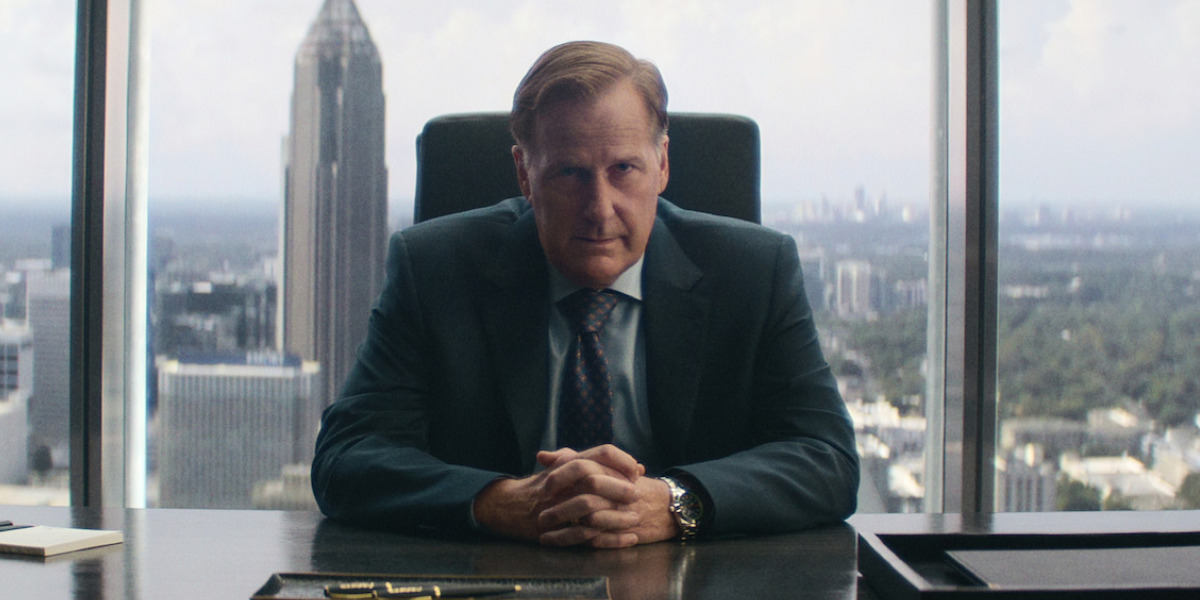Netflix’s ‘A Man in Full’ delves into the life of a businessman who finds himself surrounded on all sides in a den of vipers as his fortune finally catches up to him. Charlie Croker, former college-star-athlete-turned-business-mogul, has been a face of success in Atlanta for a while— with his crown jewel, the Croker Concourse building, standing tall as a symbol of his triumph. However, he’s finally forced to check his ego when PlannersBanc jumpstarts a pursuit after the man’s 800 million dollar loan— an endeavor that promises to lead Charlie to bankruptcy. As a result, Charlie finds himself going into a pride— and finance—driven battle with his favored attorney, Roger White, by his side and bankers Raymond Peepgrass and Harry Zale across enemy lines.
The show proposes an exploration of morality and legacy while utilizing the socio-politics presented by Atlanta’s contained environment. In doing so, the show charts a riveting tale that will leave the audience wondering about the story’s ties to reality. Consequently, the protagonist’s business ventures— Croker Industries and Croker Global Foods— are bound to come under similar questioning.
The Fictionalization of The Croker Business
In adapting Tom Wolfe’s 1998 eponymous novel to the screen, ‘A Man in Full’ modifies and modernizes certain aspects, including Charlie Croker’s character. Still, despite any changes, the base premise of the character, including his professional life, remains rooted in Wolfe’s work. As a result, Croker Industries, a real-estate-based business, and Croker Global Foods can be credited to the novel. For the same reason, both business ventures remain fictitious in nature, mirroring the fictionality of their originating show and novel.

However, ‘A Man in Full’ strives to bring a realistic narrative of a businessman’s life experiences as his empire crumbles down in an inevitable fall. Therefore, both businesses under the Croker banner remain critical players in cementing the world around the character to imbue Charlie’s professional life with realistic elements. Even though Croker Industries and its real-estate ventures rarely retain relevance within plot developments, the company’s existence solidifies Charlie’s authenticity as a business mogul.
Furthermore, Croker Industries also remains a simultaneous lifeboat and canon in the sinking ship that the Croker business has become. Although Charlie may wish to save his drowning funds with the projections from his real-estate business, he can’t deny that an ambitious take on previous business ideas landed him in a mess to begin with. Thus, narratively, his company remains a fascinating, if understated, fixture. Likewise, Croker Global Foods also influences the narrative in similar ways.
Even so, this stream of Charlie’s business molds the plot in another significant aspect as it becomes the introduction grounds for Conrad Hensley. Conrad’s storyline charts a much different path than Charlie and his financial troubles, instead delving into the complications of race, the judicial system, and the prison system. Since Conrad works at the Croker Global Foods warehouse, his character and drastically distinct storyline maintain a connection to Charlie’s narrative. The same allows the show to explore various different storylines while still serving an overarching narrative. As such, despite remaining fictional businesses, both Croker Industries and Global Foods retain narrative significance.
Read More: Best Lawyer Movies on Netflix


You must be logged in to post a comment.